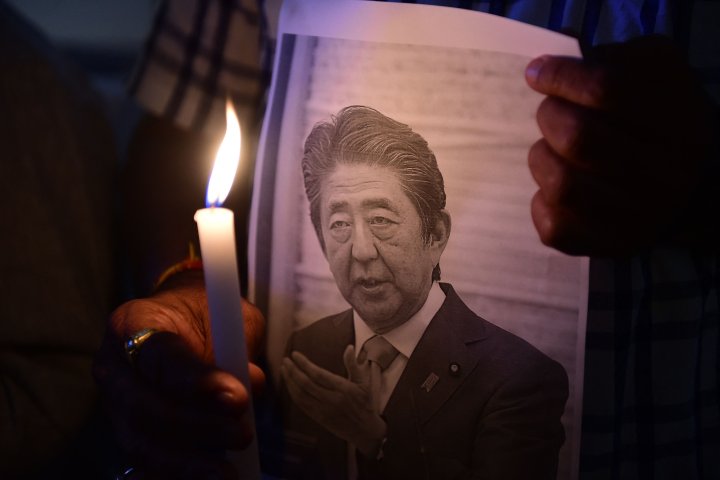
The assassination of former Japanese prime minister Shinzo Abe is another sign that political violence is growing around the world, experts say, as extremist attitudes become further normalized.
The isolation and economic downturn caused by the COVID-19 pandemic has driven more people online and into spaces where they have become radicalized, those experts add. The growing threat will require attention and action from governments who must confront the issue of domestic terrorism and extremism, they say.
“I’m very worried,” said Ruth Marshall, a political scientist and religious studies professor at the University of Toronto.
“Those of us who study extremism and political violence — and it’s a small group — are growing very concerned that this is on the rise.”
Police in Japan say Tetsuya Yamagami, the 41-year-old man accused of murdering Abe during a campaign speech with a homemade gun on Friday, told investigators he had plotted to kill him because he believed rumours about the former leader’s connection to a certain organization that police did not identify.
According to the police account, Yamagami’s mother had been bankrupted by donations to the organization, which was later identified as a fringe religious group known as the Unification Church.
Tomihiro Tanaka, head of the church’s Japan branch, later confirmed the mother was a member but distanced the group from the shooting, which he called “perplexing” and caused him “deep outrage.”
The church — often described as a financially-motivated cult whose followers are referred to as “Moonies,” after its South Korean founder Sun Myung Moon — has hosted speeches by Abe and other conservative world leaders, including Donald Trump and members of his administration.

Moon’s son, Sean Moon, has since created his own church in Pennsylvania known as the Rod of Iron Ministries that has ties to far-right figures like Steve Bannon, and has spread conspiracy theories about impending civil war in the United States.
But all of that doesn’t fully explain why Yamagami allegedly felt compelled to shoot and kill Abe, says Jonathan Miller, a director and senior fellow at the MacDonald-Laurier Institute who studies the Indo-Pacific region.
He says a large number of men of Yamagami’s generation, impacted by Japan’s economic downturn in the early 1990s, are living at home and sometimes dealing with mental health issues — and are increasingly turning to online sanctuaries.
“The online space in Japan, it does have some fringe and some dark parts on the web that have been taken advantage of by some to recruit and radicalize,” he said.
“If this was someone who was in a poor economic situation, he was disaffected and angry, he may have been inspired somewhere down the line to take matters into his own hands. But we don’t know enough about how that happened or why.”
Japan is no stranger to conspiracy theories or political violence. A cult group known as the Aum Shinrikyo deployed sarin gas on the Tokyo subway in 1995, killing 14 people. There have been reports of the QAnon conspiracy gaining a foothold in the country, although some have disputed its impact.
Yet much like in the West, politicians in Japan have seized upon political dissatisfaction for their own gains. After Abe’s assassination, social media users pointed to comments made by Akihiko Kurokawa, secretary-general of the populist NHK Party, who said Abe was responsible for funding groups like the Unification Church as a front for “foreign spy activities.”
Despite condemning the shooting, NHK Party leader Takashi Tachibana took time to suggest Abe’s death was inspired in part by economic turmoil created by the policies of the ruling Liberal Democratic Party — of which Abe was a member — that have put people in a “desperate situation.”
Miller says this type of political divisiveness is being seen around the world, and is contributing to the rise in extremist behaviour.
“Different divisions in politics are no longer ‘disagree, but don’t be disagreeable,’ but rather ‘disagree and be disagreeable and be divisive,’” he said. “And some of these divisions are leading into significant levels of of of extremism.”

Republican politicians in the U.S. like Donald Trump and his allies have painted Democrats as election frauds and “evil” people intent on destroying the country. The committee investigating the Jan. 6, 2021, attack on the U.S. Capitol has presented evidence showing that rhetoric helped fuel the riot.
On Tuesday, the committee demonstrated how far-right groups like the Proud Boys and Oath Keepers had direct lines to the Trump White House and Republican lawmakers, and were inspired by their attacks on the election to plan for violence at the Capitol.
In Canada, far-right figureheads were openly wishing the so-called “Freedom Convoy” blockade that shut down Ottawa for three weeks early this year would be “our Jan. 6 moment” that could “bring down the government” — even calling for people to be hanged.
Conservative MPs, including leadership frontrunner Pierre Poilievre, have shown support for the Freedom Convoy movement, whose organizers have documented ties to extremism and racism.
Poilievre and other MPs have insisted they only support peaceful protests against COVID-19 vaccine mandates and reject any racist or violent beliefs.
But experts have told Global News that politicians risk legitimizing such fringe, extremist groups by cozying up to them.
“Politicians have a more mainstream audience than the extreme fringe does,” Evan Balgord, executive director of the Canadian Anti-Hate Network, said in an earlier interview.
“So when a politician endorses it, marches with them, it is now introducing those ideas, those concepts, those movements, those ideologies to a wider audience.”
Marshall says there are “very, very few” countries in the world that are immune from such a rise in extremism, particularly far-right populism or fascism, which can quickly sour into authoritarian “strongman” politics.
She says the COVID-19 pandemic has further driven people deeper into their social media algorithms, where misinformation and conspiracy theories proliferate.
“Violence often becomes the solution if you’re in this paranoid mode of thinking,” she said.

Political dissatisfaction is growing in other countries too. A recent report and survey by the United Kingdom-based group Hope Not Hate suggests over half the population is “not satisfied with the way democracy is working in the U.K.”
A German government report found instances of politically-motivated violent crime had grown by 10 per cent last year compared to the year before. In Brazil, a local political opposition official was shot dead last weekend during the runup to national elections.
Miller says governments need to look inward and have honest conversations about domestic extremism and politically-motivated violence, including how those attitudes are shaped by the internet.
Although Canada, the U.S. and other Western nations have tried to sound the alarm — both the FBI and the Canadian Security Intelligence Service have identified domestic extremism as their top priority — Miller says Japan may be slow to address the problem.
“There’s still a sense in Japan that, even though they admit they’re not a perfect country, we don’t have the same problems as these other countries,” he said. “It’s not a lack of willingness to have the conversation, but more whether they’ll give it the priority it deserves.
“But this is something not only Japan but also the entire G7 needs to focus on. Because it’s not going away.”
— with files from Global’s Rachel Gilmore
© 2022 Global News, a division of Corus Entertainment Inc.


